We may not have the course you’re looking for. If you enquire or give us a call on +46 850282424 and speak to our training experts, we may still be able to help with your training requirements.
Training Outcomes Within Your Budget!
We ensure quality, budget-alignment, and timely delivery by our expert instructors.
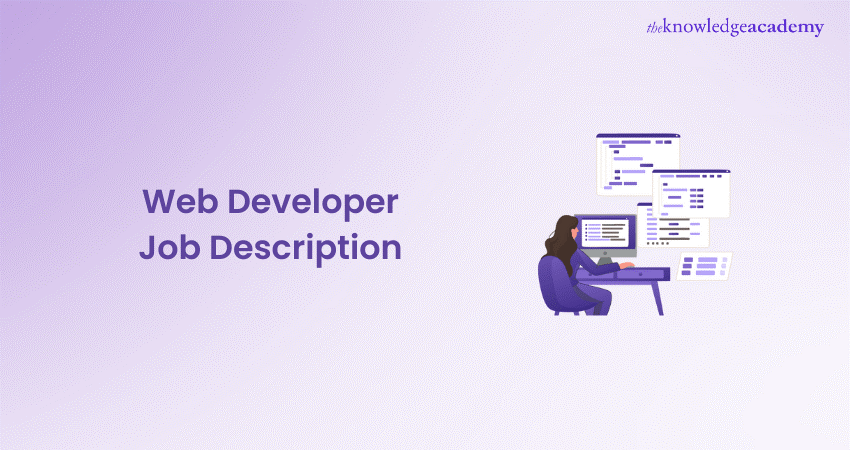
Ever wondered what it takes to shine in the ever-evolving world of Web Development? As an aspiring developer, you might find yourself asking, “What makes a Web Developer stand out in the competitive market?” or “How do you balance technical expertise with creative problem-solving?” Understanding the Web Developer Job Description can help you get an idea of the skills employers are looking for when hiring Web Developers.
In this blog, we’ll delve into the intricacies of a Web Developer Job Description. From mastering programming languages to embracing user experience design, discover what it takes to thrive in this dynamic industry. Dive in and transform your digital dreams into reality.
Table of Contents
1) Who is a Web Developer?
2) Different Types of Web Developer Roles
3) Responsibilities and Job Requirements of Web Developers
4) Web Developer Required Skills
5) Essential Qualifications for Web Developers
6) Examples of Web Developer Job Description
7) Salary Expectations for Web Developers
8) Conclusion
Who is a Web Developer?
A Web Developer transforms abstract ideas into functional online experiences, bridging the gap between imagination and reality. They use a diverse set of tools and technologies to build the digital landscapes we navigate daily. At their core, Web Developers are problem solvers with the technical skills to tackle complex challenges and the creativity to envision innovative solutions.
Their toolkit encompasses programming languages, frameworks, and libraries, ranging from HTML and CSS for structure and styling to JavaScript for interactivity and functionality.
Different Types of Web Developer Roles
Web Development is a diverse field with various specialisations, each focusing on different aspects of creating and maintaining websites and web applications. Here are some of the main types of Web Developer roles:
1) Back-end Web Developer
Back-end Web Developers write code for server-side systems and services. When combined with front-end technologies, their work ensures a smooth, personalised response to user requests. These professionals specialise in server-side scripting languages.
2) Front-end Web Developer
Front-end developers focus on the website’s structural layout. They blend graphical, functional, and aesthetic elements of web design to ensure optimal performance across all devices.
Design visually appealing and user-friendly websites with our Front-End Web Development Course - sign up today!
3) Full-stack Developer
Full-stack Web Developers are proficient in both back-end and front-end programming. Their expertise in both areas makes them some of the highest-paid professionals in the Web Development industry.
Responsibilities and Job Requirements of Web Developers
A Web Developer encompasses a broad spectrum of creative abilities, technical skills, and Project Management capabilities. Here are the detailed requirements and responsibilities associated with this pivotal position:
1) Mastery of Programming Languages and Frameworks
a) Programming Languages: Expertise in HTML, CSS, and JavaScript, which form the foundation of Web Development.
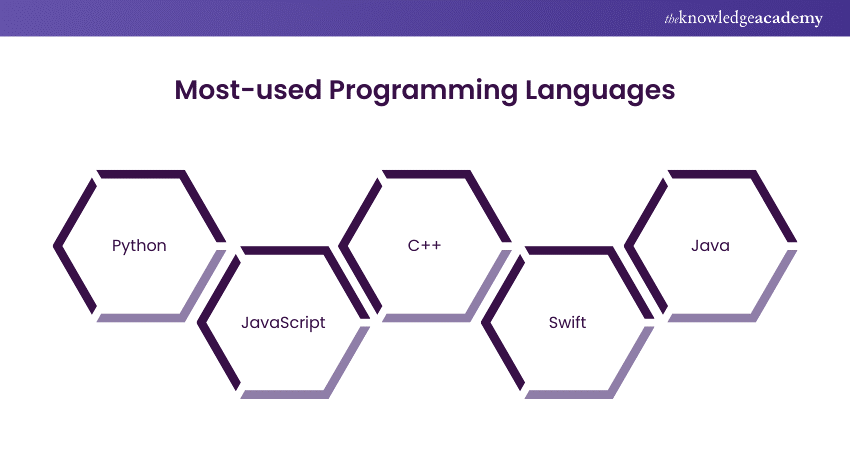
Being skilled in utilising modern frameworks and libraries helps them to enhance web functionality and user experience.
b) Frameworks: Familiarity with front-end frameworks like React, Angular, or Vue.js, and back-end frameworks, like Node.js, Django, or Laravel are essential for building robust and scalable web applications.
2) Proficiency in Back-end Development
a) Back-end Development: Competence in server-side scripting languages, including PHP, Python, Ruby, or Java and frameworks, including Express.js, Flask, or Spring Boot.
b) API Development: Experience in building RESTful Application Programming Interfaces (APIs) for communication between the front-end and back-end components of web applications.
3) Expertise in Front-end Development
a) Front-end Development: Proficient in CSS for styling and layout, HTML for web page structure, and JavaScript for adding interactivity and generating dynamic content.
b) Responsive Design: Skilled in crafting responsive and visually appealing User Interfaces (UI) that provide seamless experiences across various devices and screen sizes.
4) Grasp of Fundamental Web Development Concepts
a) Web Development Principles: In-depth knowledge of responsive design, web accessibility standards and cross-browser compatibility is crucial for creating user-friendly and inclusive web experiences.
b.) SEO Best Practices: Ability to implement best practices in Search Engine Optimisation (SEO) to optimise website visibility and enhance organic traffic.
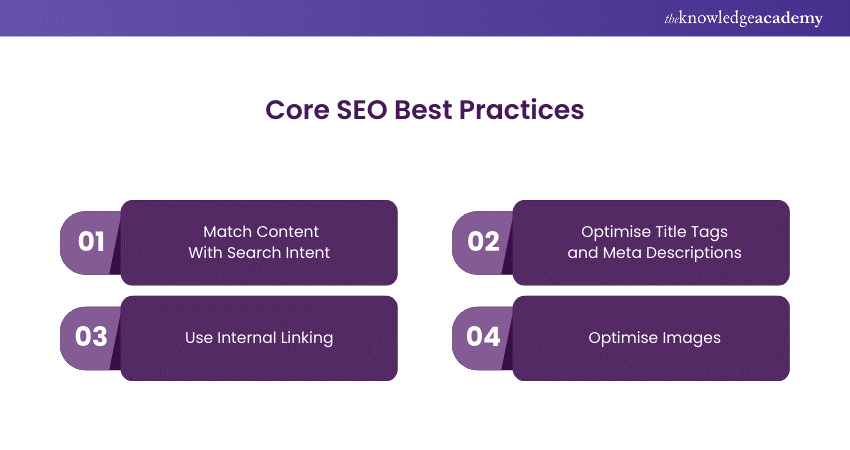
Additionally, proficiency in leveraging Data Analytics can help them monitor performance and make data-driven decisions for continuous improvement.
Register for our Symfony Web Development Training and master one of the most powerful PHP frameworks!
5) Competency in Database Administration
a) Database Management: Expertise in Database Management Systems (DBMS) such as MySQL, PostgreSQL, or MongoDB allows Web Developers to keep, retrieve, and manipulate data within web applications.
b) SQL and ORMs: Knowledge of Structured Query Language (SQL) for database querying and manipulation, along with familiarity with Object-Relational Mapping (ORM) like Sequelise or Hibernate, is beneficial.
6) Effective Collaboration and Communication Skills
a) Effective Communication and Collaboration: Essential for engaging with clients, designers, and other stakeholders to comprehend project requirements, offer technical insights, and ensure alignment with project objectives.
b) Teamwork: Capable of working collaboratively within cross-functional teams, fellow developers, including designers, Project Managers, and quality assurance testers, to provide high-quality web solutions within specified timelines.
7) Aptitude for Troubleshooting and Debugging
a) Problem-solving: Strong problem-solving abilities and debugging skills are necessary for identifying and resolving technical issues and ensuring the smooth functioning of web applications.
b) Debugging Tools: Proficiency in utilising debugging tools and browser developer tools to troubleshoot errors in code and application behaviour.
8) Aptitude for Project and Time Management
a) Project Management: Strong Project Management and Time Management skills to effectively prioritise tasks, manage workload, and meet project deadlines.
b) Adaptability: Ability to multitask effectively, adapt to changing project requirements and priorities, and thrive in a fast-paced and dynamic work environment.
9) Commitment to Lifelong Learning and Advancement
a) Learning and Development: Commitment to constant learning and professional development to stay updated with the recent technologies, trends, and best Web Development practices.
b) Professional Growth: Participation in online workshops, courses, conferences, and community events to improve skills, expand knowledge, and foster innovation in the Web Development field.
Web Developer Required Skills
The skills and qualifications needed for a Web Developer position can differ based on the specific role, industry, and level of experience. Nonetheless, here is a detailed list of skills and qualifications that are frequently sought after in Web Developers:
1) Technical Skills
1) Programming Languages Proficiency: Skilled in Hypertext Markup Language (HTML), Cascading Style Sheets (CSS), and JavaScript (including ES6+), with a working knowledge of server-side scripting languages such as Hypertext Preprocessor (PHP), Python, Ruby, or Java.
2) Front-end Development: Experienced in using front-end frameworks and libraries, that include React.js, Angular, Vue.js, or jQuery to create interactive user interfaces.
3) Back-end Development: Familiarity with Express.js, Node.js, Django, Flask, and Spring Boot for server-side development.
4) Database Management: Skilled in managing database systems like MySQL, PostgreSQL, MongoDB, or Firebase, with a strong grasp of SQL for data querying and manipulation.
5) Version Control: Experienced in using Version Control systems like Git. This expertise is essential for code management, collaboration, and version tracking.
6) Web Development Tools: Familiar with Web Development tools and utilities such as npm, Yarn, Webpack, Babel, ESLint, and others for project setup, dependency management, and code optimisation.
7) Web Accessibility Standards: Knowledgeable about web accessibility principles and experienced in implementing Web Content Accessibility Guidelines (WCAG) standards to ensure inclusivity and compliance.
8) Responsive Design: Capable of creating responsive web designs using CSS media queries and frameworks, including Bootstrap or Foundation for optimal viewing experiences across various devices.
9) API Integration: Experienced in integrating and consuming third-party Application Programming Interfaces (APIs) for data exchange and functionality enhancement.
10) Testing and Debugging: Proficient in using testing frameworks, including Jest, Mocha, or Jasmine for unit testing and debugging tools for identifying and resolving code errors.
11) Cross-browser Compatibility: Knowledgeable about browser rendering engines and techniques to ensure consistent performance and appearance across various devices and browsers.
12) Security Best Practices: Understanding of web security principles like HTTPS, Cross-site Request Forgery (CSRF) protection, input validation, and secure authentication mechanisms, to mitigate vulnerabilities and security risks.
Unlock the potential of Python for Web Development - sign up for our Web Development Using Python and Web2py Course.
2) Soft Skills
1) Problem-solving Abilities: Strong problem-solving and analytical skills to effectively identify and resolve technical issues.
2) Creativity: Creative thinking and design skills to conceptualise and implement visually appealing as well as user-friendly interfaces.
3) Communication Skills: Sound written and verbal skills to interact effectively with team members, clients, and stakeholders.
4) Collaboration: Ability to collaborate with cross-functional teams
5) Time Management: Effective time management skills to tackle workload, meet deadlines, and prioritise tasks.
6) Adaptability: Flexibility and adaptability to comprehend new tools, technologies, and methodologies.
7) Attention to Detail: Meticulous attention to detail to guarantee code quality, maintainability, and adherence to project requirements and coding standards.
8) Continuous Learning: Commitment to constant learning and professional development to stay informed with emerging technologies and industry trends.
Essential Qualifications for Web Developers
Here are the crucial qualifications every Web Developer should possess:
1) Bachelor’s degree in Information Technology, Computer Science, Software Engineering, or a related discipline.
2) Relevant certifications like MEAN Stack Web Development Course or credentials from recognised organisations.
3) Proven experience in Web Development through internships, freelance work, personal projects, or contributions to open-source initiatives.
4) Impressive portfolio showcasing projects, websites, or applications developed by the candidate, highlighting technical proficiency and creativity.
Create scalable and robust web applications with our MEAN Stack Web Development Training - register now!
Examples of Web Developer Job Description
Here are some detailed examples of job descriptions for Web Developers. Use these as a guide to understand what employers typically look for in candidates and to tailor your own job postings or applications:
Example:
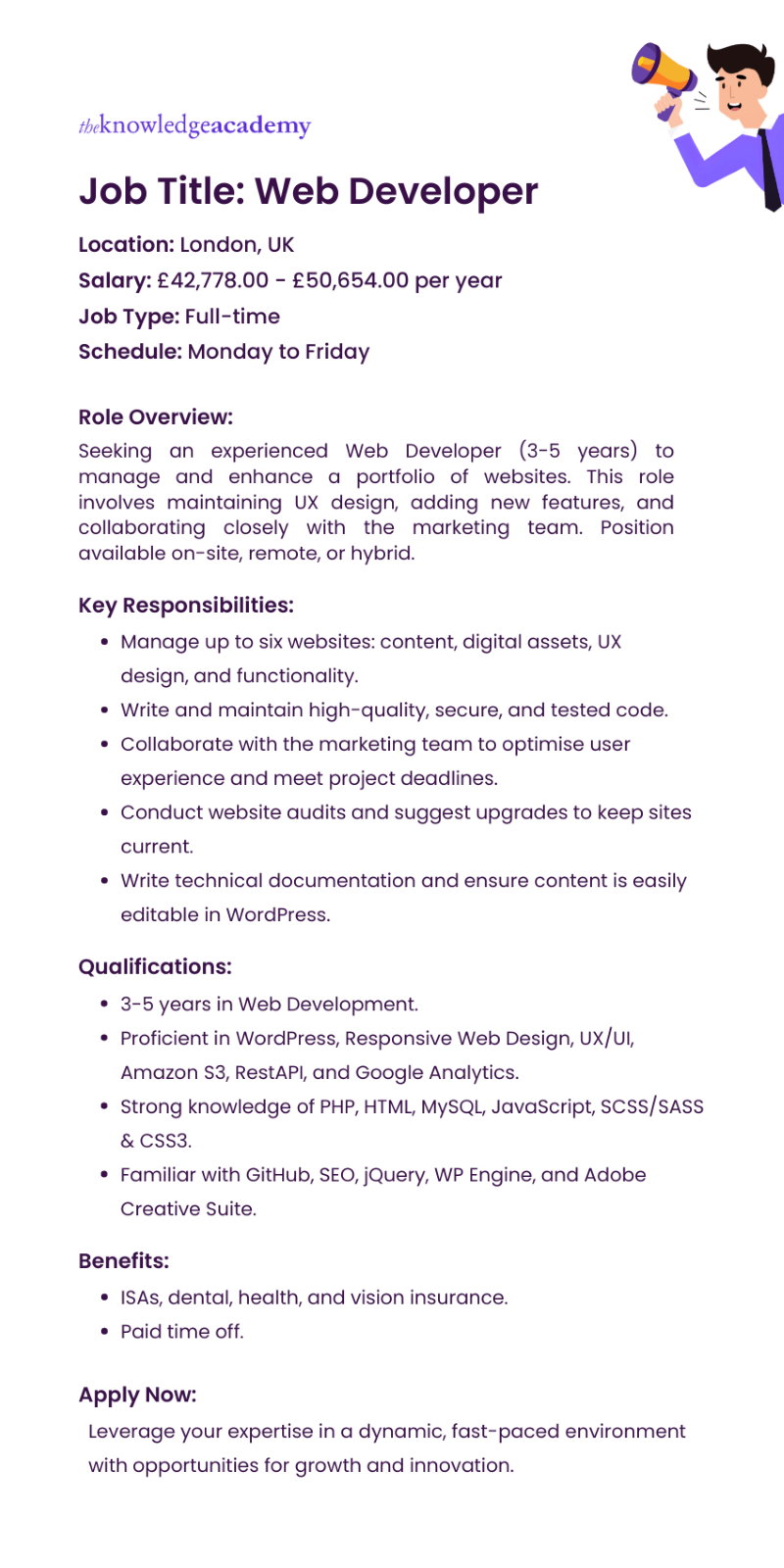
Salary Expectations for Web Developers
Web Developers’ salaries are based on factors like experience, location, and the specific technologies they specialise in. Here's a detailed breakdown of the Web Developer Salary ranges as per different countries:
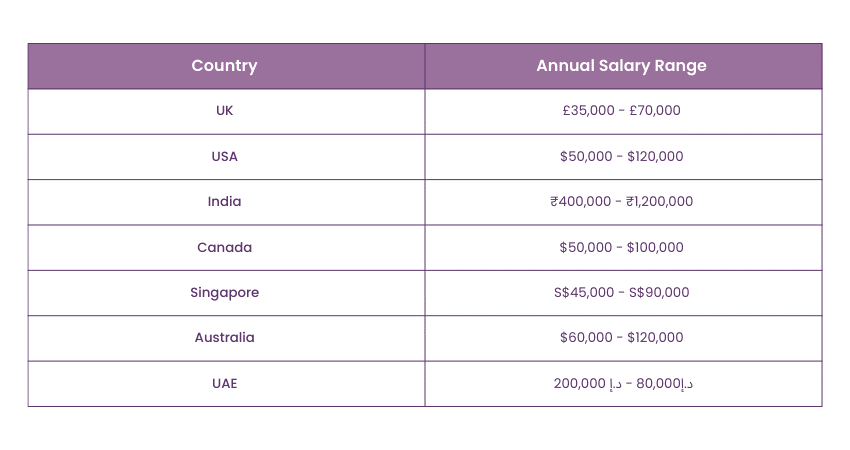
Source: Glassdoor
Conclusion
Mastering a blend of technical skills and creative prowess is your key to success in the Web Development world. In case, you seek to break into the industry, understanding the diverse Web Developer Job Description can set you on the path to innovation. So, embrace the challenge, and transform the digital landscape with your unique expertise!
Sign up for our UX Design Course and master the art of creating seamless user experiences.
Frequently Asked Questions

Businesses, organisations, and individuals needing a strong online presence require Web Developers. This includes e-commerce companies, media outlets, educational institutions, startups, and more.

Yes, Web Development is a rewarding career. It offers excellent job prospects, competitive salaries, and opportunities for creativity and problem-solving. The requirement for skilled Web Developers continues to grow, ensuring long-term career stability and advancement in various industries.

The Knowledge Academy takes global learning to new heights, offering over 30,000 online courses across 490+ locations in 220 countries. This expansive reach ensures accessibility and convenience for learners worldwide.
Alongside our diverse Online Course Catalogue, encompassing 17 major categories, we go the extra mile by providing a plethora of free educational Online Resources like News updates, Blogs, videos, webinars, and interview questions. Tailoring learning experiences further, professionals can maximise value with customisable Course Bundles of TKA.

The Knowledge Academy’s Knowledge Pass, a prepaid voucher, adds another layer of flexibility, allowing course bookings over a 12-month period. Join us on a journey where education knows no bounds.

The Knowledge Academy offers various App & Web Development Trainings, including the Git & GitHub Fundamentals Course, Mobile App Development Course, and UX Design Course. These courses cater to different skill levels, providing comprehensive insights into Git vs GitHub.
Our Programming & DevOps Blogs cover a range of topics related to Web Development, offering valuable resources, best practices, and industry insights. Whether you are a beginner or looking to advance your Programming & DevOps skills, The Knowledge Academy's diverse courses and informative blogs have got you covered.
Upcoming Programming & DevOps Resources Batches & Dates
Date
 Git & GitHub Fundamentals
Git & GitHub Fundamentals
Fri 28th Feb 2025
Fri 4th Apr 2025
Fri 27th Jun 2025
Fri 29th Aug 2025
Fri 24th Oct 2025
Fri 5th Dec 2025







 Top Rated Course
Top Rated Course



 If you wish to make any changes to your course, please
If you wish to make any changes to your course, please


